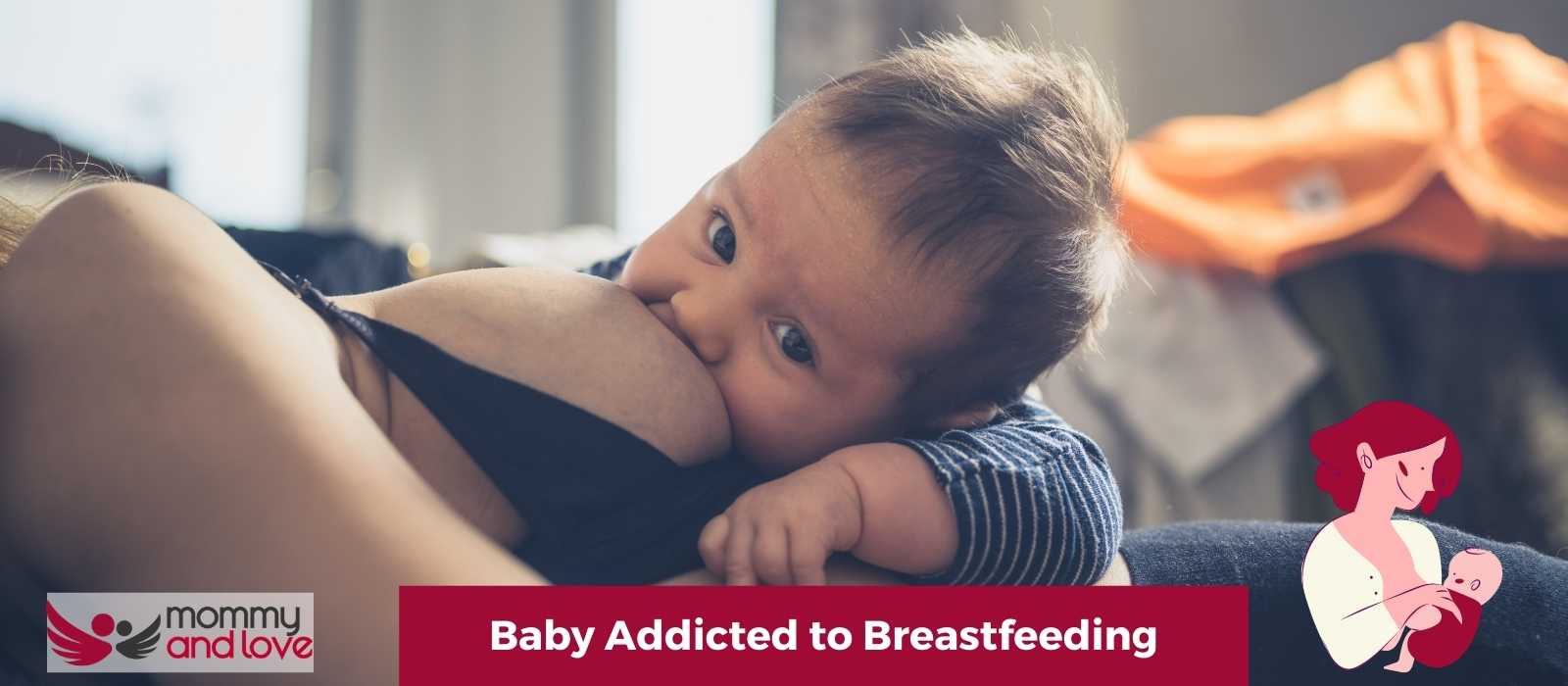The first time a baby suckles at its mother’s breast for human milk, it may be the most magical moment of their young lives. Infants breastfeeding is an experience that can have lifelong benefits for the mothers and their little ones.
Infants breastfeeding is a wonderful experience for both mother and child, but sometimes it can become an addiction for the baby. When a baby is addicted to breastfeeding, it means that the mothers and baby are not able to wean off of breast milk.
If breastfeeding becomes an addiction for the baby, it can cause problems for both the mother and child and can also cause problems for the child later.
Why Is My Baby So Obsessed With Breastfeeding? (4 Valid Reasons)

Your baby may be addicted to breastfeeding if the entire day is spent on breasts. This is not a bad thing, but it does mean that you will need to breastfeed your baby frequently in order to keep them happy.
Mother and baby needs rest and nap once in a while during day and night. Make sure you are comfortable with this and do not feel rushed or pressured to breastfeed your baby night long.
There are a few reasons why your baby may be addicted to breastfeeding. First, breast milk is the perfect food for a baby so he falls asleep faster, not stays awake longer and can achieve complete relaxation. It contains all the nutrients that a baby needs to grow and develop properly, especially the bedtime routine. Breast milk also contains antibodies that help protect babies from illnesses and infections so they can have normal growth.
Second, the milk that is produced when you breastfeed is very nutritious and has a high-fat content. This makes it very satisfying for your little one. Third, breastfeeding is a very calming and relaxing experience for your child during bedtime and nap time plus the extra cuddles from the mother.
Lastly, breastfeeding for a few months can help your baby develop a strong emotional bond with you. This is because nursing and breastfeeding are very intimate experiences for both mothers and their babies. The most important thing is it allows them to share a special connection with each other that cannot be replicated anywhere else.
Children need to be breastfed for a while, but it’s not an addiction. Nursing and breastfeeding are important in the early years of life as they support growth and develop healthier connections with mothers through this vital act that creates long-term bonds between them until children outgrow its necessity at different times.
What Is the Minimum Breastfeeding Time?
Some babies need to breastfeed for a long time, and it is not wrong. The World Health Organization recommends parents exclusively breastfeed from birth to the first six months of a baby’s life. Once you have breast milk exclusively for this period, it’s important that they continue getting nutrients from mother’s milk until 2 years old or beyond – even if children are able to begin eating other foods after 1-year-old.
After that, a toddler can continue breastfeeding along with complementary foods. It is ideal that babies typically start to eat solid foods around 6 months of age. However, every baby is different and some may start sooner or at some point later than others. When you want to stop breastfeeding, make sure you have your plans in place to reduce breastfeeds gradually, its not wise to do it cold turkey.
Does Too Much Breastfeeding Affect Baby?
Some babies get addicted to breastfeeding which convincingly lead to some bad effects on them. There isn’t a lot of research on this topic, but some studies suggest that there can be some negative effects on babies if they are breastfed too much.
For example, excessive breastfeeding can cause babies to become overweight or obese. It can also affect their cognitive development and sleep habits. This is because when babies are breastfed too much, they are not getting the opportunity to learn how to self-regulate their feeding, which can lead to problems with weight gain later in life.
Its not like a chemical addiction which may be a worry, but they love the comfort when they nurse and some parents find it can be hard to break that. When it comes to maternal medications there is also no need to worry. Indisputable observational evidence prove that babies do not become addicted via breastmilk, unlike drugs taken during pregnancy.
How to Break the Feed-to-Sleep Habit

It is common for babies to fall asleep while breastfeeding. This is because the sucking motion of the baby’s mouth can be calming and soothing. It is also a way for the baby to relax and fall asleep.
It can be hard to transition your baby from breastfeeding to another form of sleeping habit. When you’re breastfeeding, your baby is used to falling asleep while nursing and may have trouble falling asleep in other ways. Stopping breastfeeding for infants at night may lead to crying and staying awake longer.
Gradually transitioning your baby from nursing to other forms of nutrition can be a challenge, but it’s worth it for both you and your little one. One way to break the habit is to gradually reduce the number of times you breastfeed your baby each day.
Start by breastfeeding your baby once in the morning and gradually decreasing the number of times you breastfeed per day and once at night. Then, gradually decrease the number of times until your baby is only breastfeeding early morning or once a day. Mothers can also try slowly reducing the number of minutes that they spend breastfeeding their baby each day. This will help the little one get used to falling asleep without nursing and crying. You can also put your stubborn baby to bed at night while they’re still awake and allow little ones to fall asleep on their own.
Right Timing
It’s important to time the weaning process correctly so that your baby doesn’t get too hungry or frustrated. Start by making the changes gradually, and only after your baby has started feeding solids. If you are breastfeeding on demand, start by weaning during a time when your baby is likely to be more content, for example, after a meal.
If they are eating solid foods, start by replacing one breastfeeding session with a meal. Slowly change more and more feeding time until there is no breastfeeding anymore. This will help your infant get used to other forms of nutrition aside from milk and make the transition easier. The idea is to make your little one or older toddler not want breasts milk but wants feeds gradually with solid food most part of the day.
Offer Alternatives
While breastfeeding is a healthy and natural way to feed a baby, it’s not the only option. If the toddlers becomes addicted to breastfeeding, offer alternatives, for example, formula feeding or using a bottle during bedtime. This can help break the addiction and allow the baby to develop normally.
If your baby is addicted to breastfeeding, you should offer them alternatives so that they can still get the nutrients they need. Try formula, cow’s milk, or soy milk. You can also feed them solid foods to eat. Start with a few tablespoons of rice cereal and slowly feed them more foods as they get older.
Final Thoughts Stopping Breastfeeding
As you can see, breastfeeding is not an addiction. Stopping breastfeeding is important but only if you want to break from breastfeeding and nursing your children (it is your body and you may want it back!)
There are some ways to stop breastfeeding, like weaning gradually transitioning so your baby doesn’t get too hungry or frustrated.

This article was written by Sandra Baker – full time writer and the mother of four amazing kids (including twins!)
She’s also a breastfeeding counselor and has spent years helping new parents learn how to care for their children. When she’s not writing or caring for her children, Sandra likes to spend time reading and taking walks with her husband.




